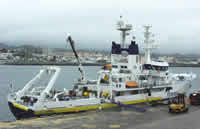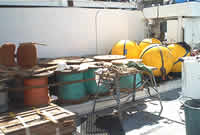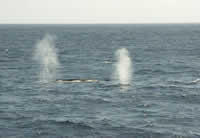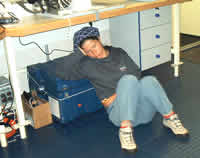
The French research vessel Le Suroit tied up in Ponta Delgada before the SIRENA Expedition. Click image for larger view.
Hydrophone mooring gear lashed on deck before sailing, including float packages, reels of low-stretch line, and boxes containing acoustic releases. Click image for larger view.
Fin whales near spotted near the Azores. The whales were part of a group of 20 to 30 fin and blue whales. Click image for larger view.
Marine mammal observer Rita Bento "resting" in the lab during the high seas. Click image for larger view.
Mission Log
May 25, 2002
Dr. Chris Fox
Principal Investigator
Sound in the Sea Project
NOAA/PMEL, Newport, Oregon
The 2002 season for Sound in the Sea has begun, and we face the same challenge that ocean explorers have faced throughout the centuries—foul weather! We are on the French research vessel, Le Suroit, which sailed from Ponta Delgada in the Portugese Azores on Saturday, May 18. We plan to deploy six underwater hydrophone moorings in the North Atlantic to explore the region acoustically.
Although not in the path of any large storm, the westerly winds have been sustained at 25-35 knots, building up seas of 5-8 meters. Le Suroit is relatively small (52 meters, or 160'), and we are being tossed about. Last night, we recorded a 35-degree roll. Despite the weather, we have succeeded in deploying three moorings, and are en route to the fourth site.
As we sailed from the Azores, we spent a few hours mapping some of the volcanic features of the Azores using the ship's EM300 multibeam mapping sonar. Portugese geologists onboard have been compiling a map of the Azores using similar opportunities from other multibeam-capable vessels.
We also have been sighting marine mammals and encountered a large pod of mixed fin whales and blue whales near the Azores. Rita Bento, a student at the University of the Azores who has been working with Sound in the Sea, is on board to record such observations.
The team and the effort are truly international. The French government, through its ocean agency IFREMER, is providing all of the ship time and support. We have four French earth scientists on board, including Dr. Jean Goslin of the Universite de Bretagne Occidentale in Brest, who is our Chief Scientist for the mission. There are three technicians provided by IFREMER to operate the multibeam sonar.
Besides the three Portugese scientists already mentioned and myself (American), Dr. Haru Matsumoto from Japan is sailing with us and is our senior engineer.
Sign up for the Ocean Explorer E-mail Update List.








